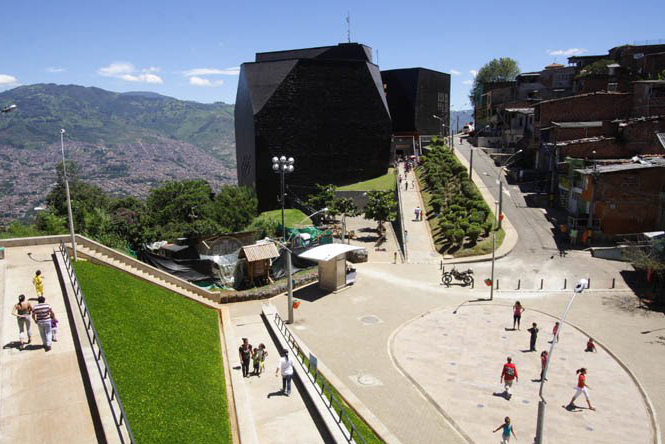4.7.1 Case Study: Entrepreneurship, Optimism and Knowledge creation in Medellín
Course subject(s)
Module 4. Managing Smart Sustainable Cities
This case study shows an example of progress in very adverse conditions. The capital of Colombia, Medellin, became an example of improvement and innovation despite a history of violence and poverty.
Medellin’s growth is intimately related to entrepreneurship, optimism, and knowledge creation. This evolution is evidenced in several aspects of the city, such as independent democratic political ideas, the city’s economic growth, the industry’s development, and the evolution of the urban infrastructure.
The transformation of Medellin started at the end of the 20th century. Several big infrastructure projects were implemented during this time, such as library parks, bike lanes, and programs for memory conservation and cultural alternatives.

Public Space Spain Library Park in Medellín
In addition, an incentive for knowledge creation was presented through several initiatives such as Ruta N, an organization devoted to promoting scientific innovation through collaboration among academia, government, and businesses, and the project “Medellin city cluster,” committed to creating competitive advantages for local companies.
Furthermore, one of the most prominent examples of entrepreneurship, innovation, optimism, and knowledge creation, is the Public Services Company of Medellin, an outcome of merging four companies that provide public energy, aqueduct, sewerage, and telephone services in the city.
In the following lecture, Professor María Alejandra Becaria describes the development of this case study in more detail, and explains how theories of optimism and knowledge creation affect societies and affect how we organize them. Please check the first video for the case study presented in English, with English and Portuguese transcripts. For the case study presented in Spanish, please check the second video.
Case Study
Main Takeaways
- This case argues that an optimistic view of the future explains the development of Medellin. Optimistic in the sense of knowing that problems are inevitable, but they can also be solved if the proper knowledge is developed on time.
- The societies’ development can be stopped, delayed, and even destroyed. In general, when bad explanations of the world are disseminated and propagated through culture, these societies are at risk of stopping progress.

Smart and Sustainable Cities: New Ways of Digitalization & Governance by TU Delft OpenCourseWare is licensed under a Creative Commons Attribution-NonCommercial-ShareAlike 4.0 International License.
Based on a work at https://online-learning.tudelft.nl/courses/smart-and-sustainable-cities-new-ways-of-digitalization-and-governance/ /



